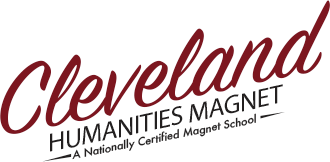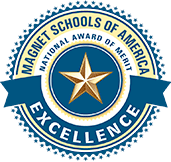About Us
Core is what makes Cleveland’s Humanities Magnet so unique. It sets us apart. Our teachers represent many disciplines, including math, science, foreign language, etc. However, Core refers specifically to the classes that are writing-based, interdisciplinary, and team-taught, primarily the literature, social studies, art history, and philosophy classes. We believe knowledge is best learned when presented holistically. If educational disciplines support and enhance each other, rather than be taught separately, knowledge is fuller, more comprehensible, more meaningful. Core is an experience of genuine and engaged learning and the major reason our magnet’s reputation is so celebrated.
Statement of Purpose
Established in 1981, Cleveland Humanities Magnet High School is the leading secondary school for the study of the Humanities in Los Angeles. Currently, we have a capacity of 851 students in grades 9-12. We enjoy a student population with a broad range of diversity in terms of race, ethnicity, and socio-economic background. This provides us with the opportunity to foster an environment of community involvement and social awareness. As one of the highest achieving magnets in the district, our program is firmly committed to preparing our students to thrive in their future academic roles as students in colleges and universities throughout the country. For example, over 80% of our graduating seniors attend a 4-year college or university their freshman year.
Our History
Magnet schools began in the late 1960s in the United States in response to the unwillingness of many parents to integrate Black and White children following the 1954 landmark Supreme Court case Brown vs. the Board of Education. There were many attempts at mandating school integration. These attempts, however, unwittingly pushed White parents who feared sending their children to school with students of color to move to the suburbs to escape such efforts, thus re-segregating schools. There was an alternative proposed– to encourage parents to voluntarily integrate schools by creating programs with specialized curriculum that would attract students based on their interests, thus bringing together diverse populations of students that can learn with and from one another. Hence, in 1981, Cleveland High School’s Humanities Magnet was born, and for over thirty-five years, has been a marker of educational excellence both for its specialized curriculum and for its diversity. We are proud to carry on this legacy of diversity.
Vision Statement
Cleveland Humanities Magnet cultivates the development of critical thinkers through the Humanities in order to improve their lives, their communities, and the world with a commitment to maintaining a culturally diverse student population.
Mission Statements
We strive to…
- promote confident, innovative, self-reflective individuals who are globally aware and actively engaged in learning for life.
- foster the academic success, social awareness, acquisition of intellectual tools, and commitment to understand and address the issues facing our world.
- afford students from all backgrounds a rigorous, relevant, and coherent curriculum.
- implement activities that deepen student connection to the broader community through the Humanities.
- focus on the development of critical inquiry and scholarship from our students and teachers.
- provide a personalized, integrated, and congenial atmosphere.
- collaborate with parents and the broader community.
- prepare all students for college and beyond.
Why a Humanities Education?
While many magnet programs focus on a narrow area of study (i.e., Math/Science, Pre-Law, Pre-Med), a Humanities education exposes students to a broader experience. Put simply, a Humanities education focuses on humankind: our development, our culture, our diversity, and our commonality. With an exposure to a wide range of study, students develop an overall appreciation for learning along with the skills necessary for life after graduation. A Humanities education provides a strong foundation for any field one pursues in college.
A Thematic Curriculum: Big Ideas Move the World
In order to make sense of the world, it is important to understand the ideas behind the events. In our program, students investigate the theories and ideas that have propelled humankind into the 21st century. Here are a few of the “Big Ideas” we study:
- Existentialism
- Platonic Idealism
- Historical and Sociological Conceptions of Race
- Marxism vs. Capitalism
- Freudian ideas of the unconscious
- Postmodernism
- Romanticism
- Multiple Intelligences
- Overcoming ethno-centricism
- Transcendentalism
- Gender identity
- Darwin and evolution
- Globalism and Globalization
An Interdisciplinary Approach: Holistic Education
We experience holistic lives, so why split up education into isolated disciplines? Cleveland’s interdisciplinary classes, called CORE classes, blur the distinctions between disciplines so that students experience continuity in their education. The four primary classes that we interweave are: History, Philosophy, Art, and Literature.
A Writing-Based Program: Essays, Essays, and More Essays
All of the major assessments in our CORE program are writing-based. For example, every 10 weeks students write an in-class, two-hour essay that combines the material from all of their CORE classes. These essays are the cornerstone of our program.
The CORE Curriculum Class Titles
These are the titles for the CORE classes, those that are taught in a thematic, interdisciplinary, and writing-based manner. Almost all are designated Honors or AP. In addition to their CORE classes, students will also take Mathematics, Science, Foreign Language, PE, etc.
Grade 9 – Honors English 9, Honors Geography (AP Human Geography), Environmental Studies
Grade 10 – Honors English 10, Honors World History and Geography
Grade 11 – Honors American Literature, Honors Humanities, AP U.S. History
Grade 12 – Honors Art History/AP Art History, Honors Economics/Honors Principles of American Democracy, AP English Literature, AP Biology
In addition, students take a full range of requirements as well as electives including:
- AP Calculus A, B, C
- AP Chemistry
- AP Computer Science Principles
- AP Macro Economics
- AP Micro Economics
- AP Environmental Science
- AP European History
- AP French
- AP Government
- AP Human Geography
- AP Psychology
- AP Physics 1
- AP Spanish
- AP Spanish Literature
- AP Statistics
- AP Studio Art


